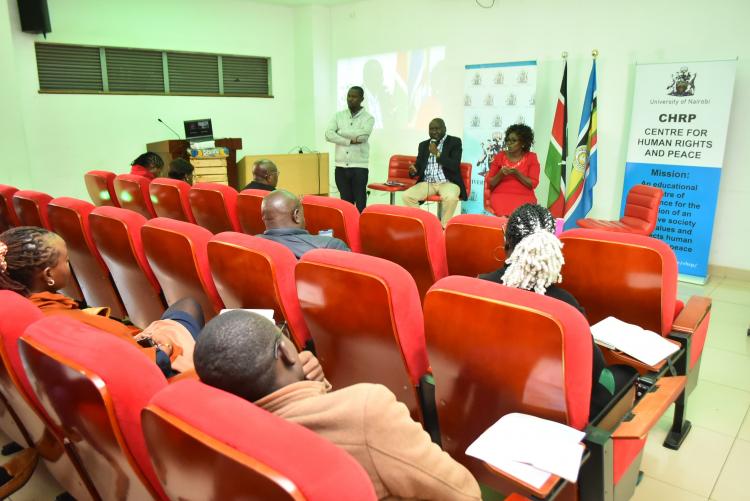Unveiling African Concepts of Sexuality
UON Center of Human Rights and Peace (CHRP), hosted an eye-opening colloquium on African sexualities: traditions, perspectives and human rights, on Tuesday 21st November 2023. The colloquium was held in partnership with the Trust for Indigenous Culture and Health (TICAH) and the Kenya Legal & Ethical Issues Network on HIV and AIDS (KELIN). The event brought together a diverse panel of experts, including legal scholars, theologians, and anthropologists, to shed light on the complex interplay between tradition, religion, and human rights. The panel was made up of expertise on these topics including, Dr. Dorcas Chebet, who specializes in the intersection of human dignity and sacred texts in the context of sexuality, Christine Nkonge, Executive Director Katiba Institute, an expert of good governance and minority rights in Kenya, Godfrey Owino Adera, a PhD candidate with a focus on African theologies and sexualities, and Dr. Kamati Shilabukha, a UON lecturer with expertise in African anthropology, gender, and African studies. Together, these experts provided a holistic view of the complex and fascinating landscape of African sexualities.
Dr. Francis Owakah, a senior lecturer at the Department of Philosophy, Faculty of Arts and Social Sciences, highlighted the nature of African attitudes towards sexuality, which he described as both divisive and shrouded in taboo. He pointed out that there is a pervasive state-led homophobia in Africa, where governments are targeting and persecuting individuals they believe are engaging in homosexual acts. Dr. Owakah also drew attention to the political manipulation of anti-homosexuality laws, which he argued are often used as a tool to gain political leverage and fuel anti-LGBTQ+ sentiment. “African argument on sexuality is divisive but is shrouded in taboo. In Africa we have state led homophobia where governments are harassing people, they think are practicing homosexuality. Law is used as a strategy to harass these groups”, he noted.
Moreover, Dr. Chebet added her comment about the inherent dignity of all human beings, regardless of sexual identity or status. It was a powerful reminder that our identities are not defined by other people's value judgments. “According to Genesis chapter 1 verse 27 God created human beings in his image make and female giving them an inherent value dignity and eternal significance. Thus no one has the right to take away the dignity of any other person regardless of their sexual identity or status”, said Dr. Dorcas Chebet, as she concluded her views on the lack of inclusivity in African sexualities.
Furthermore, the colloquium discussions highlighted the need to base value judgments on reason, not emotion. This approach is essential for fostering greater understanding and acceptance of sexual identity and its role in African societies. Dr. Owakah explained that academics play a key role in this process by engaging in analyzing issues in order to contribute effectively to the evolution of societal attitudes and norms related to sexuality. “The business of academics is to take part in public discourse, to participate in these debates, we want to understand, we want to clarify meaning and issues” said Dr. Owakah as he elaborated his final remarks on the role of academia in the discussions on African sexualities.
Ultimately, the conversation at the colloquium underscored the urgent need for greater inclusivity and understanding of diverse sexual identities in African societies. As noted by the Master of Ceremony, Dr. Kathleen Anangwe, while there is still a long way to go in addressing the prejudices and inequalities that exist, the conversation itself is a step in the right direction. The underlying conclusion was that engaging in open dialogue and using reason and empathy, we can work towards creating a more inclusive and accepting Africa.
Click on the link below for more information on the colloquium
https://www.youtube.com/live/m_aAF-N8u5k?si=MG7AwxYdcqoer7-y
- Log in to post comments

